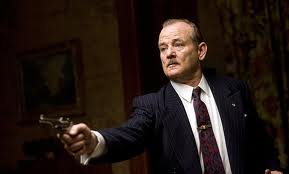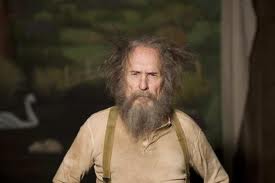Blog Archives
The Grand Budapest Hotel
In the heart of Europe lies the Republic of Zubrowka, a fictional land of provincial villages and ski resorts, that is threatened by a looming war. A beacon of escape and repose still remains despite this trouble: the Grand Budapest Hotel.
When debonaire and devoted concierge M. Gustave H. (an amazing Ralph Fiennes) is charged with the murder of an elderly hotel guest (Tilda Swinton), it is up to his faithful lobby boy Zero Mustafa (Tony Revolori, later F. Murray Abraham) to rescue his beloved mentor from certain death. Many years later, a young writer (Jude Law, later Tom Wilkinson) learns the story of Zero and Gustave, and now the tale is bequeathed to us, the audience.
Of all the Wes Anderson movies, Grand Budapest is easily the most Wes Anderson-est: we have the costumes and the actors (an incredible ensemble, I might add), every multi-layered set and centered shot, all wrapped up in a color-scheme that makes your sweet tooth squirm with delight.
A new convention utilized in this film is the multi-framing of the narrative. Not only is the story told to us from the Author’s perspective, but we’re given M. Mustafa’s iteration as well. Anderson conveys this to us by switching up the aspect ratios, one viewpoint at a time – thus fitting the dialogue and visuals to suit respective needs.
Personally, I would have loved to see this concept challenged more often throughout the film, but it is understandable not to do so, being that the narrative could have easily been disturbed otherwise. Additionally, by keeping this meta-perspective in mind, the visual spectacle we’re subjected to is completely understandable, if not expected.
The other issue to be taken is that the relationship between Zero and Agatha (Saoirse Ronan) is more implied than experienced. But because Zero himself is telling us about their adventures, the very mention of Agatha is pained and in a sense, neglected – unless their interaction is directly related to the main plot.
I’m not going to spoil anything this time around, but there is a reason Zero does not want to talk about her – and thanks to the genius of F. Murray Abraham’s Oscar-winning story-telling ability, we as an audience understand his hesitance completely. More so, this tonal shift compliments the underlying theme of combating loneliness – a trait carried by both Zero and M. Gustave.
I’ve said it before and I’ll say it again – I love Wes Anderson movies. I understand that for those unfamiliar with his work or style, watching something like Grand Budapest is like witnessing an inside joke. Similarly, I obviously carry a favorable bias. Despite these possible barriers, I find these facts to be certain: The Grand Budapest may be a character profile film, but below its colorful candy shell is a core of loneliness and longing. While these darker matters are often distracted by shenanigans, there is a resinating desire for closure while not being totally bogged down in the process, resulting in a tale of whimsy and well, humanness.
Witty, colorful and shenanigans abound, The Grand Budapest Hotel is a satisfying reminiscence of love, loss, mystery, escapism, and most importantly, etiquette.
Final Grade: A
Wes Anderson
Please forgive my quietness, I was getting over some sort of flu nastiness at the time. Also for some reason it was difficult to find high-quality footage on this one.
WYSHW: Get Low
Bill Murray. C’mon, what else do you need to see this movie?
Really though, Get Low (2009) is a little sleeper film that’s worth a peek. Based in 1930’s Tennessee, story is about a hermit named Felix Bush (played by Robert Duvall), who through the years has been the subject of many a urban legend, tall tale, and ghost story. Finally Felix decides to rid himself of his burdens, wishing to throw himself a grand funeral party while he’s still alive.
Funeral director Frank Quinn (Murray), tempted by Felix’s hermit-wad-o’-cash, takes the task upon himself to solicit guests, opening old wounds. The result is this bittersweet drama about love, loss, guilt and redemption – but really it’s not as grandiose as it sounds. Get Low kind of like Big Fish, minus the magical realism and father-son dynamic – just simple, sadish truths about misconception and people, that’s all. And it’s not at all drab, either – it’s actually quite funny and undoubtedly charming.
Sweet, sad, and incredibly over-looked – three things that make Get Low perfect What You Should Have Watched material.
Next time on What You Should Have Watched, Sean Penn gets weird.





